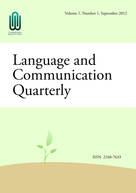


Volume 10 Issues 1-4 (2021-12-31)
Volume 9 Issues 1-4 (2020-12-31)
Volume 8 Issues 1&2 (2019-06-30)
Volume 7 Issues 3&4 (2018-12-31)
Volume 7 Issues 1&2 (2018-06-30)
Volume 6 Issues 3&4 (2017-12-31)
Volume 6 Issues 1&2 (2017-06-30)
Volume 5 Issues 3&4 (2016-12-31)
Volume 5 Issues 1&2 (2016-06-30)
Volume 4 Issues 3&4 (2015-12-31)
The objective of this article is to explore the notion of Identity and Multiculturalism with regard to the construction of meaning in the novel ‘The Namesake’ by Jhumpa Lahiri using the triadic relationship of S.O.I (Sign, Object and Interpretant) as given by C. S. Peirce. Along with semiotics, techniques of psychoanalytic analysis have been used in this article in an attempt to understand the meaning encoded by the author in a fictional novel. This article also attempts to look for cues in the novel to analyze whether the construction of narrative in the novel has anything to do with the unconscious of the author. This study finds that construction of meaning is contextual, dynamic and subjective; it may change with even a slight change in the act of communication.
This study discusses the results of a survey and focus group discussions conducted to explore how preservice teachers perceive nonnative English-speaking (NNES) graduate teaching assistants (GTAs) in ESL methodology and ESL assessment courses at a university in the southwestern U.S. A total of 262 preservice teachers were surveyed. Of the 262 preservice teachers, 20 participated in focus group discussions to provide further insight on their views of NNES GTAs. Qualitative and quantitative research findings of the study are discussed and important implications for teacher education programs in the U.S. and internationally are shared.